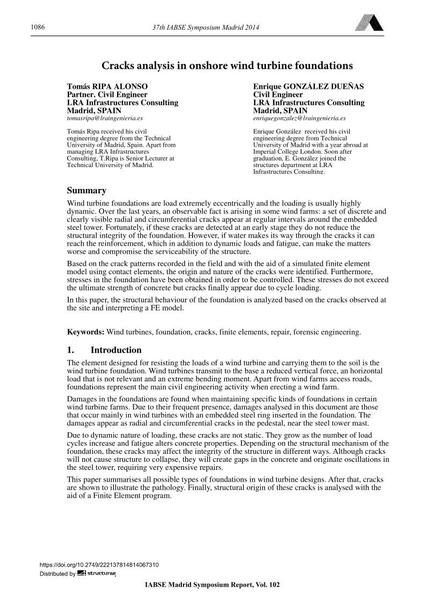Cracks analysis in onshore wind turbine foundations

|
|
|||||||||||
Détails bibliographiques
| Auteur(s): |
Tomás Ripa Alonso
Enrique González Dueñas |
||||
|---|---|---|---|---|---|
| Médium: | papier de conférence | ||||
| Langue(s): | anglais | ||||
| Conférence: | IABSE Symposium: Engineering for Progress, Nature and People, Madrid, Spain, 3-5 September 2014 | ||||
| Publié dans: | IABSE Symposium Madrid 2014 | ||||
|
|||||
| Page(s): | 1086-1092 | ||||
| Nombre total de pages (du PDF): | 7 | ||||
| Année: | 2014 | ||||
| DOI: | 10.2749/222137814814067310 | ||||
| Abstrait: |
Wind turbine foundations are load extremely eccentrically and the loading is usually highly dynamic. Over the last years, an observable fact is arising in some wind farms: a set of discrete and clearly visible radial and circumferential cracks appear at regular intervals around the embedded steel tower. Fortunately, if these cracks are detected at an early stage they do not reduce the structural integrity of the foundation. However, if water makes its way through the cracks it can reach the reinforcement, which in addition to dynamic loads and fatigue, can make the matters worse and compromise the serviceability of the structure. Based on the crack patterns recorded in the field and with the aid of a simulated finite element model using contact elements, the origin and nature of the cracks were identified. Furthermore, stresses in the foundation have been obtained in order to be controlled. These stresses do not exceed the ultimate strength of concrete but cracks finally appear due to cycle loading. In this paper, the structural behaviour of the foundation is analyzed based on the cracks observed at the site and interpreting a FE model. |
||||
| Mots-clé: |
fondation ingénierie forensique éoliennes
|
||||
